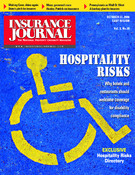Insurance issues have taken a back seat to crime and taxes but there is evidence that the candidates locked in the race to succeed Massachusetts Gov. Mitt Romney do have insurance on their radar.
Republican Kerry Healey has made deregulation of auto insurance a key issue in her campaign. Her Democratic rival, Deval Patrick, while not opposing auto insurance reform, has stressed making the state’s new health insurance law work and going after businesses that cheat the state’s workers compensation system.
Healey includes car insurance reform among her priorities for improving the state’s business climate, along with cutting taxes on small business. She includes competitive rating for car insurance, which was pushed by her boss, Mitt Romney, on a list of 50 practical ideas she says she would pursue if elected.
“People are often rewarded for good behavior, unless of course, you are a Massachusetts driver. In the Commonwealth, good drivers have to pay for the bad driving habits of others. If this doesn’t sound fair, that’s because it isn’t. Drivers should pay premiums that reflect their own driving records. Over 60 percent of all drivers have clean driving records and by reforming the state’s auto insurance system, good drivers will save money and benefit from lower rates,” she states.
Health mandate
Under the state’s new law that mandates individuals carry health insurance, businesses with more than 10 employees pay $295 per worker per year if they fail to provide health insurance to their employees. Healey opposes this employer contribution.
“I will not accept any attempt to link healthcare reform with a new tax on business,” she has said. “We will never be able to effectively compete with our neighboring states — let alone the rest of the world — until we recognize that our jobs and our workers are already taxed too much.”
Patrick has taken a different stand. “Implementing health care reform in Massachusetts is one of the biggest challenges the next governor faces,” Patrick says. He argues that the landmark law passed with the support of the business community, health care professionals, advocacy organizations, and consumer groups and therefore the “contribution of all those groups will be necessary in bringing health care to all Massachusetts residents.”
As part of his plan to make government more efficient, Patrick stresses workers compensation, specifically the act of employers misclassifying salaried or waged workers as independent contractors. “This allows employers to avoid payment of workers’ compensation premiums, unemployment insurance assessments, tax withholdings, and other mandated benefits. Meanwhile, employers that play by the rules are unfairly penalized,” says the Democrat.
Patrick cites a Harvard/UMass Boston study that found that the state treasury loses an estimated $152 million due to misclassification, the unemployment fund loses up to $35 million, and the workers’ compensation system loses an estimated $91 million.
Healy also supports letting cities and towns purchase health coverage for employees through the state Group Insurance Commission.
Was this article valuable?
Here are more articles you may enjoy.


 Trump’s Repeal of Climate Rule Opens a ‘New Front’ for Litigation
Trump’s Repeal of Climate Rule Opens a ‘New Front’ for Litigation  Allstate CEO Wilson Takes on Affordability Issue During Earnings Call
Allstate CEO Wilson Takes on Affordability Issue During Earnings Call  Florida Insurance Costs 14.5% Lower Than Without Reforms, Report Finds
Florida Insurance Costs 14.5% Lower Than Without Reforms, Report Finds  Trump Demands $1 Billion From Harvard as Prolonged Standoff Appears to Deepen
Trump Demands $1 Billion From Harvard as Prolonged Standoff Appears to Deepen 


